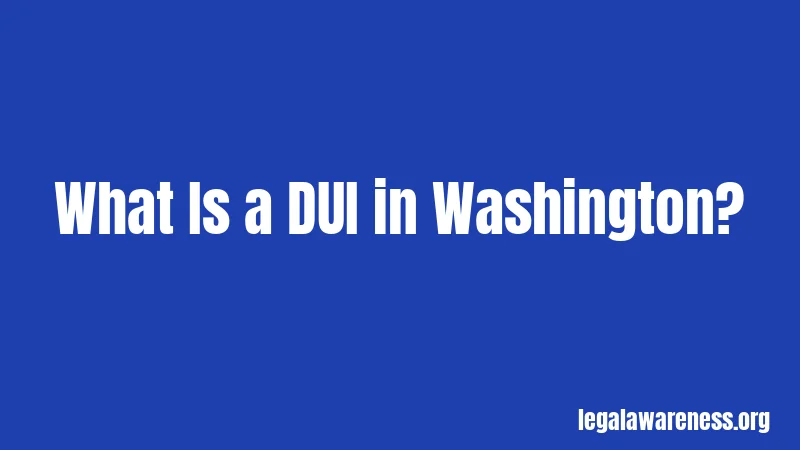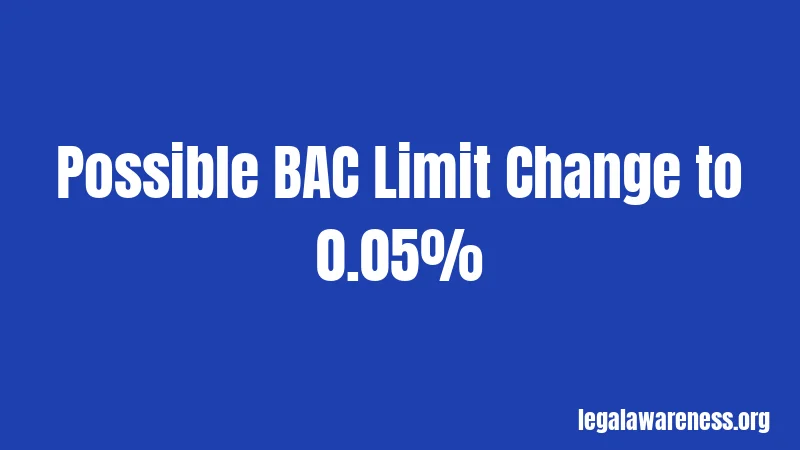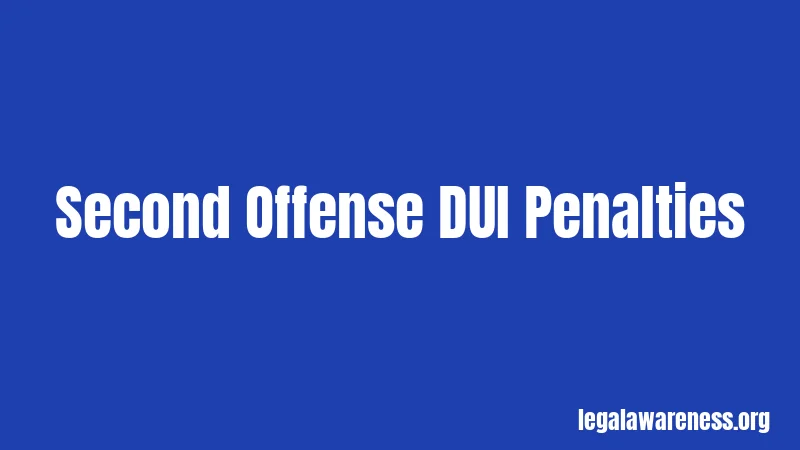DUI Laws in Washington (2026): Major Changes Coming Fast
Most people think they know the DUI laws in Washington. They really don’t. And honestly, that’s a problem, because 2026 is bringing some of the biggest changes to DUI laws the state has seen in years.
Washington already has some of the toughest DUI penalties in the country. Now they’re getting even stricter. Let’s break down exactly what you’re facing if you get pulled over.
What Is a DUI in Washington?

Pretty straightforward. A DUI means driving under the influence of alcohol or drugs. This includes illegal drugs, prescription medications, and marijuana.
The current legal limit is 0.08% blood alcohol concentration. But hold on, this part is important. You can still get a DUI below 0.08% if the officer thinks you’re impaired. Yep, that’s all it takes.
For drivers under 21, Washington has zero tolerance. Literally. If you’re underage and your BAC is 0.02% or higher, you’re getting charged with an underage DUI.
Big Changes in 2026 You Need to Know
Okay, pause. Read this carefully.
Washington is making major changes to DUI laws starting January 1, 2026. Some of these changes could seriously affect you, especially if you’ve had a prior DUI.
The 15-Year Lookback Period
Here’s the deal. Washington used to count prior DUIs for 10 years. Starting in 2026, that period extends to 15 years.
What does this mean for you? If you got a DUI 12 years ago and get arrested again, that old conviction now counts against you. It didn’t before. The penalties jump way up when you have priors.
This change makes it much easier to face felony DUI charges.
When DUI Becomes a Felony
Most people don’t realize how quickly a DUI can become a felony in Washington. Under the new law, if you have three or more DUI convictions within 15 years, your next DUI is a felony.
Think of it like this. First DUI is a gross misdemeanor. Second DUI is still a gross misdemeanor. Third DUI? Still a gross misdemeanor. But that fourth one within 15 years? That’s a Class B felony.
Felony DUI means serious prison time. We’re talking state prison, not county jail.
Second Chance at Deferred Prosecution
Here’s some good news. Washington used to allow deferred prosecution only once in a lifetime. Starting in 2026, you might qualify for a second deferred prosecution.
Wondering if this applies to you? You need to have completed your first deferred prosecution successfully. And you can’t have had another DUI in the past 15 years.
Deferred prosecution lets you avoid a conviction by completing treatment instead. It’s a pretty big deal.
Possible BAC Limit Change to 0.05%

Wait, it gets better. Or worse, depending on how you look at it.
Washington lawmakers are seriously considering lowering the legal BAC limit from 0.08% to 0.05%. Senate Bill 5067 has already passed committee. If it becomes law, Washington would be only the second state after Utah to have a 0.05% limit.
Sound complicated? It’s actually not. A 0.05% BAC is roughly two drinks for most people. Maybe three if you’re larger. That’s it.
This hasn’t passed yet, but support is growing. The 2026 legislative session could make this happen.
First Offense DUI Penalties
Let’s talk about what happens when you get your first DUI. Honestly, this is the part most people miss.
If your BAC was below 0.15%, you’re looking at a minimum of 24 hours in jail. Maximum is 364 days. You’ll also face fines between $990 and $5,000.
But if your BAC was 0.15% or higher, or you refused the breath test? The minimum jumps to 48 hours in jail. The fines increase too.
Many people assume they won’t go to jail for a first offense. They’re wrong.
Alternatives to Jail Time
Right? Jail sounds scary. The good news is you might qualify for electronic home monitoring instead. That’s basically house arrest with an ankle bracelet.
For a first offense with a BAC under 0.15%, you could do 15 days of home monitoring instead of jail. If your BAC was higher or you refused testing, you’re looking at 30 days of home monitoring.
There’s also the 24/7 Sobriety Program. This requires you to check in for alcohol testing twice a day for 120 days. Pretty much means your life revolves around testing for four months.
Second Offense DUI Penalties

A second DUI within seven years is way more serious. The penalties multiply fast.
Minimum jail time is 30 days. If your BAC was 0.15% or higher, the minimum increases to 45 days. Alternatives include 60 to 90 days of electronic home monitoring.
Fines range from $1,150 to $5,000. License suspension is two years minimum. And you’re required to install an ignition interlock device for five years.
Confused about the difference? A first offense might let you keep some driving privileges. A second offense basically takes your license away completely unless you get an ignition interlock license.
Third Offense and Felony DUI
This one’s probably the most important rule. Third and fourth offenses within seven years come with 90 days minimum jail time.
But here’s where it gets really serious. Under the new 2026 law, if you have three or more prior DUIs within 15 years, your next DUI becomes a felony.
Felony DUI is a Class B felony. Maximum sentence is 10 years in prison and a $20,000 fine. Yes, actual prison.
You’re not alone, this confuses a lot of people. They think DUIs always stay misdemeanors. They don’t.
License Suspension Explained
Your license gets suspended in two different ways. The Department of Licensing suspends it administratively when you’re arrested. The court suspends it again if you’re convicted.
These suspensions run separately. Totally.
For a first offense with a BAC under 0.15%, the DOL suspension is 90 days. If your BAC was 0.15% or higher, or you refused testing, the suspension is one to two years.
Not sure what counts as a violation? Refusing to take a breath or blood test triggers an automatic one-year suspension. Even if you’re never convicted of DUI.
You have seven days from your arrest to request a hearing to fight the administrative suspension. Miss that deadline and you’re stuck with it.
The Ignition Interlock Device Requirement
Now, here’s where things get serious. Actually, they’re already serious, but this part affects your daily life the most.
An ignition interlock device is basically a breathalyzer installed in your car. You blow into it before the car starts. If it detects alcohol above 0.025% BAC, your car won’t start.
How Long You Need the IID
First offense? One year minimum. Second offense? Five years. Third or subsequent offense? Ten years.
Yep, that’s all you need. No exceptions unless you qualify for a medical exemption.
The device also requires random tests while you’re driving. Miss a test or fail one, and your horn starts honking continuously. Your lights flash. Basically, you’re signaling every cop in the area.
Hold on, this part is important. You need the IID on every vehicle you drive. Not just the one you own. Every single one.
Work Vehicle Exception
Here’s a little-known rule. You can get an exemption for employer-owned vehicles if you drive for work.
Your employer fills out an Employer Declaration for Ignition Interlock Exemption. File it with the Department of Licensing before you drive any work vehicles.
This only works if the vehicle isn’t assigned exclusively to you. If it’s your company car for commuting, you need the IID installed.
IID Costs
Let’s talk money. Installation runs about $100. Then you pay $2.50 to $3.50 per day to lease the device.
Washington also charges a $21 monthly fee for the Ignition Interlock Device Revolving Account. This helps fund the program for low-income drivers.
Monthly calibration appointments are required. Miss one and your license gets suspended again.
Special Circumstances That Make Things Worse
Okay, these are the aggravating factors. They turn a bad situation into a really bad situation.
Minor in the Vehicle
Having a child under 16 in your car when you get a DUI? That adds an extra 12 months to your ignition interlock requirement. If your BAC was 0.15% or higher, it adds 18 months.
Each kid counts separately. Two kids means 24 extra months minimum.
Refusing Chemical Testing
Washington has an implied consent law. By having a driver’s license, you’ve already agreed to take a breath or blood test if arrested for DUI.
Refuse the test? Your license gets suspended for at least one year. And prosecutors use your refusal as evidence of guilt in court.
Many people think refusing helps them. It usually makes things worse.
Commercial Drivers
If you drive commercially, the BAC limit is 0.04% while operating a commercial vehicle. Less severe than a felony, but still no joke.
Get convicted of a DUI in your personal vehicle? You can still lose your commercial driver’s license. Even if you weren’t driving commercially at the time.
Drug DUI
Marijuana, prescription drugs, illegal drugs. All carry the same penalties as alcohol DUI.
For marijuana, the legal limit is 5 nanograms of THC per milliliter of blood. For other drugs, there’s no set limit. The prosecutor just has to prove you were impaired.
How DUI Affects Your Record
Here’s something that surprises most people. A DUI conviction stays on your record for 99 years in Washington. Seriously.
You can’t get it expunged. You can’t get it sealed. You can’t get it vacated. It’s permanent.
This affects employment, housing, insurance, everything. Background checks will show your DUI basically forever.
Deferred Prosecution Program
Let me break this down. Deferred prosecution is probably your best option if you qualify.
You plead guilty, but the court doesn’t enter the conviction. Instead, you complete a two-year treatment program. Successfully finish it, and after three more years, the charge gets dismissed.
Requirements for Deferred Prosecution
Wondering if you can use this? You need to admit you have an alcohol or drug problem. Then you commit to a court-approved treatment program.
You also install an ignition interlock device. Avoid all alcohol and drugs. Stay out of trouble completely.
Mess up once, and the deferred prosecution gets revoked. The court enters your guilty plea as a conviction. You face all the regular penalties.
Remember, you could only use deferred prosecution once in a lifetime before. Starting in 2026, you might qualify a second time if you’ve been conviction-free for 15 years.
How to Fight a DUI Charge
Most people don’t realize how many ways you can challenge a DUI. An experienced attorney can often find problems with the prosecution’s case.
Challenging the Traffic Stop
Officers need reasonable suspicion to pull you over. If they didn’t have a valid reason, everything after that might be thrown out.
This includes evidence from field sobriety tests, breath tests, all of it.
Questioning Breathalyzer Accuracy
Breathalyzers aren’t perfect. They require regular calibration. Officers need proper training to use them correctly.
Certain medical conditions affect results. Acid reflux, diabetes, even your diet can cause false readings.
Field Sobriety Test Issues
These tests are super subjective. Nervousness affects performance. Medical conditions affect performance. The road surface, lighting, weather, all of it matters.
Many people fail field sobriety tests completely sober. They’re not as reliable as prosecutors claim.
What to Do If You’re Arrested for DUI
Okay, this one’s important. Stay calm. Be polite. Don’t argue with the officer.
You should provide your license, registration, and insurance. Answer basic questions about your identity.
But you don’t have to answer questions about drinking. You can politely decline to answer. You have that right.
Deciding whether to take the breath test is complicated. Refusing triggers an automatic one-year suspension. But taking it gives the prosecutor evidence.
Talk to an attorney before making decisions. Most DUI lawyers offer free consultations. Use them.
Getting Your License Back
Here’s where people get really confused. Getting your license reinstated after a DUI involves multiple steps.
First, you complete all court requirements. Pay all fines. Finish any jail time or treatment programs.
Then you install the ignition interlock device. Get SR-22 insurance. This is special high-risk insurance that proves you have coverage.
Apply for an Ignition Interlock License with the Department of Licensing. Pay the fees. Wait for approval.
The whole process takes time. Plan accordingly.
DUI and Immigration Consequences
If you’re not a U.S. citizen, a DUI conviction can affect your immigration status. Seriously.
Felony DUI can result in deportation. Even misdemeanor DUI can cause problems with visa renewals or green card applications.
Talk to an immigration attorney if you’re facing DUI charges and you’re not a citizen.
Insurance Impact
Your insurance rates will skyrocket. No way around it.
Most insurance companies drop you completely after a DUI. You’ll need SR-22 insurance, which costs way more than regular insurance.
Expect your rates to stay high for at least three years. Some companies keep them elevated for five years.
Employment Consequences
Many employers run background checks. A DUI shows up on those checks for 99 years, remember?
Jobs requiring driving are obviously out. But other employers might pass on you too. Professional licenses can be affected.
Some careers require disclosure of criminal convictions. A DUI conviction counts.
Resources and Help
If you’re struggling with alcohol or drug issues, treatment is available. The Washington Department of Social and Health Services can help connect you with programs.
Many treatment programs offer sliding scale fees based on income. Don’t let cost stop you from getting help.
Frequently Asked Questions
Can I get a DUI for sleeping in my car while drunk?
Yes, actually. Washington’s “physical control” law means you can be charged even if you’re not driving. If you’re in the vehicle with the keys and you’re impaired, that’s enough.
Will my DUI show up on background checks?
Absolutely. DUI convictions stay on your record for 99 years in Washington. They show up on criminal background checks for employment, housing, everything.
Can I drive to work with a suspended license?
No. But you can apply for an Ignition Interlock License. This lets you drive anywhere, anytime, as long as you have an IID installed and maintain SR-22 insurance.
How much does a DUI really cost in Washington?
Between fines, attorney fees, insurance increases, ignition interlock costs, and lost wages, most people spend $10,000 to $25,000 on a first offense. Second and third offenses cost way more.
Does a wet reckless count as a prior DUI?
For DUI purposes, yes. If your DUI was reduced to reckless driving or negligent driving as part of a plea deal, Washington still counts it as a prior offense if you get arrested again.
Final Thoughts
Washington’s DUI laws are strict. The 2026 changes make them even stricter. That 15-year lookback period is a game-changer for anyone with a prior DUI.
If you’re facing DUI charges, get an attorney. Don’t try to handle this yourself. The consequences are too serious.
And if you’re worried about your drinking? Get help now. It’s easier to address the problem before you get arrested than after.
Stay safe, make smart choices, and remember that one night of bad judgment can affect your life for decades in Washington.
